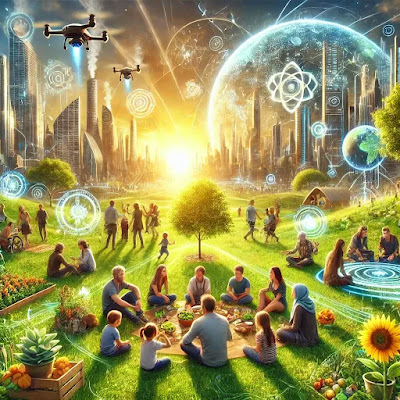It's Time to Stop Pretending and Start Being Real
As we stand at the threshold of a new year, it's time for an honest conversation. Over the past few years, we’ve allowed ourselves to drift farther from who we truly are. Social media, filters, and now AI have become tools that, while innovative, have turned into instruments of self-deception.
It started innocently enough: pretending to have a life we didn’t actually live for the sake of likes, views, and followers. Then came filters—tools that reshaped our appearances, so we could fit into some distorted norm. Finally, AI entered the picture, not as a villain, but as an enabler. With face-swaps, voiceovers, and AI-generated avatars, we've created faceless personas that are projections, not reflections, of our true selves.
This has gone beyond unhealthy—it’s destructive.
In chasing approval, we’ve traded our uniqueness for conformity. In curating perfection, we’ve buried our imperfections, the very things that make us human. We’ve lost touch with our authentic selves. And for what? A fleeting moment of validation? A few bucks? Some followers? In truth, we’ve paid the highest price: we’ve lost our sense of self.
But it doesn’t have to be this way.
Imagine a world where the greatest achievement is simply being yourself. A world where authenticity is celebrated, and honesty is the new trend. Where we value connection over perfection, substance over style, and generosity over greed.
We don’t need more filters; we need more truth. We don’t need more followers; we need more love. We don’t need to impress strangers; we need to reconnect with ourselves.
Let’s make 2025 the year we find our way back to what truly matters. Let’s commit to honesty, love, and self-expression. Let’s stop pretending and start living as the beautiful, imperfect, and irreplaceable people we truly are.
If this resonates with you, share this article. Let’s spread a message of hope and authenticity for the year ahead. Together, we can inspire a movement where being yourself is the greatest trend of all.
Wishing you and your loved ones a peaceful, joyful, and authentic New Year. May 2025 be the year we reclaim who we are.
This is my last article for 2024! I thank you all who read what I had to say and shared their thoughts with me. I will start a new series of articles on January 2nd, 2025. You are all welcome to come back and be part of this journey. If you guys are interested, I will start some life events where we can meet and chat a little and have a true exchange about issues that matter to us. Let me know if you are interested, and I will prepare for it.
With love and hope,
yours truly, Robert Ziehe




















